Julie Milchev is a natural-born caregiver.
“I was always very nurturing. I would take care of everything and everybody,” she said — whether it was animals on her family’s acreage near Gresham, Ore., or school classmates being teased and bullied. “I would feel so sorry for them. I would invite them to sleep over and I’d do their hair. I just wanted to help people and fix things,” she said.
Today Milchev, 47, tends her aging mother for love and numerous clients for pay. She’s an itinerant caregiver for the Vancouver office of Home Instead Senior Care, a national chain. Between all that, she said, she’s never truly “off work.”
“Patience, enjoyment of people and a sense of humor” are her livelihood’s key ingredients, she said. Milchev has all that, but she’s only human, she added: “It’s not always fun. Sometimes you grit your teeth.”
Enlarge

Amanda Cowan/The Columbian
Quick lessons
Eric Erickson backed into caregiving in college by accident. He knows he blew a job interview badly, but got hired anyway — because he’s a bundle of energy by nature, and because the local Area Agency on Aging was desperate for warm bodies, he joked.
Erickson cannot forget interviewing an impoverished, elderly couple about their declining health and increasing needs while ants crawled all over their furniture. He was dedicated to serving the couple with dignity and respect, he said, but it was an awful scene. And within a month, both of them were dead.
Aging: The number of elderly Americans is rising sharply.
- The number of elderly Americans is rising sharply.
- 48 million: over age 65 now
- 88 million: over age 65 in the year 2050
- 6.3 million: over age 85 now
- 19 million: over age 85 in 2050
Working as an elder caregiver “can be really emotionally difficult. Some people are equipped for that, and some are not. You find out pretty quickly” whether you love it or hate it, Erickson said.
Erickson learned that he loves it. “It can also be so gratifying,” he said. “You leave every day feeling good about what you’ve done.”
Some, like Milchev, never leave at all. A large subset of senior caregivers are folks who learned their eventual occupation in childhood, as a basic family value; others are spouses or children who have little choice but to tend loved ones round-the-clock, and are glad to get a little compensation from Medicaid; some have pursued the medical and business training they need to work as private contractors, or for a care home or agency like downtown Vancouver’s CDM Services, where Erickson is now executive director.
However they came to the field, the best caregivers display a special personality type. Erickson said Washington state is looking to develop personality assessments to better identify the workers who’ll thrive, and the ones who’ll wither, when they leave planet Earth and land on the planet of people with dementia.
“You’re not living in your world anymore,” said Julie Williams, owner of the local Home Instead franchise. “You have to live in theirs.”
Just trying it
Who chooses this intimate, demanding and famously underpaid work? CDM conducted a workforce analysis recently, Erickson said, and determined that its caregivers break into even thirds. One-third have been doing this work for 10-plus years, another third for one to 10 years, and one-third are only in their first year.
Enlarge

Alisha Jucevic/The Columbian
In other words, one-third of all current caregivers are entry-level and just trying it. Many won’t stay.
“It is not well-paid,” said Daniela Micu, the owner of Columbia Care Home. “It’s almost charity work.”
And yet, Erickson added, pay and professional standards are growing. Washington is at the forefront of this, he said, with a state law extending bargained-for pay raises to both agency and independent caregivers. That’s made the situation a little more stable and lucrative — and a lot more regulated and demanding.
“What people were dealing with on the job, maybe 15 years ago, was a cakewalk compared to today,” Erickson said. “Nobody gets into this for the money.”
Everyone The Columbian interviewed for these stories stressed that point: If money is your real motivation, move along.
Future epidemic
But money matters, Erickson said. Unless many more caregivers are deployed, and efficient new models for delivering care are pursued — such as day care at spots like CDM — the unmet need “will reach epidemic proportions,” he said.
Demand: Growing faster than the workforce.
- Fastest, most: Home health aide/personal care job growth versus any other field, now through 2024
- 700,000: Home care jobs in 2005
- 2.2 million: Home care worker jobs today
- 2.8 million: Home care worker jobs in 2024
What are future employment prospects in this field? Across the nation, the vast majority of people who get into caregiving are women of color and meager education; their entry into the workforce is flattening out fast, according to the Bureau of Labor Statistics. Meanwhile, America’s elderly population is skyrocketing.
Plus, there’s politics. Until just recently, Republicans in Congress were hunting for votes for a replacement for the Affordable Care Act; all proposals featured radical changes to Medicaid, the nationwide health insurance program for the poor — chiefly, spinning it off for individual states to manage, and reducing federal Medicare support by roughly $800 billion. The quest may continue throughout the year.
If that does happen, experts say, watch out for a cascade of current caregivers quitting the business — and a cascade of elderly people losing assistance and moving back in with their adult children.
“If they decrease Medicaid by $800 billion … it’ll affect every adult family home in the state,” Williams said. “All those 50-year-olds … will be taking Grandma and Grandpa back into their houses. It’ll be the creation of many more family caregivers — whether they like it or not.”
Enlarge

Ariane Kunze/The Columbian
Juli Colson: Compassionate and curious
When lunchtime at Angelbrook Senior Living approaches, Juli Colson cues up The King.
“Went to a party at the county jail! The prison band was there and they began to wail!”
Annetta Houseman, who’s been sad and flat under a quilt all morning, starts grinning and wiggling. Suddenly she’s on her feet, holding hands with Colson and twisting her blues away. “Oh boy!” she laughs, years vanishing from her face. “Fun fun fun!”
Annetta was feeling lost, Colson says, but Elvis Presley always knows exactly where to find her — and Colson knows where to find Elvis. She dances a gleeful Annetta over to the lunch table, where fellow resident Theodore Turner is grinning at the floor show. Annetta, now seated and watching an
Elvis video, can’t quit rocking out: “So great! Wow!”
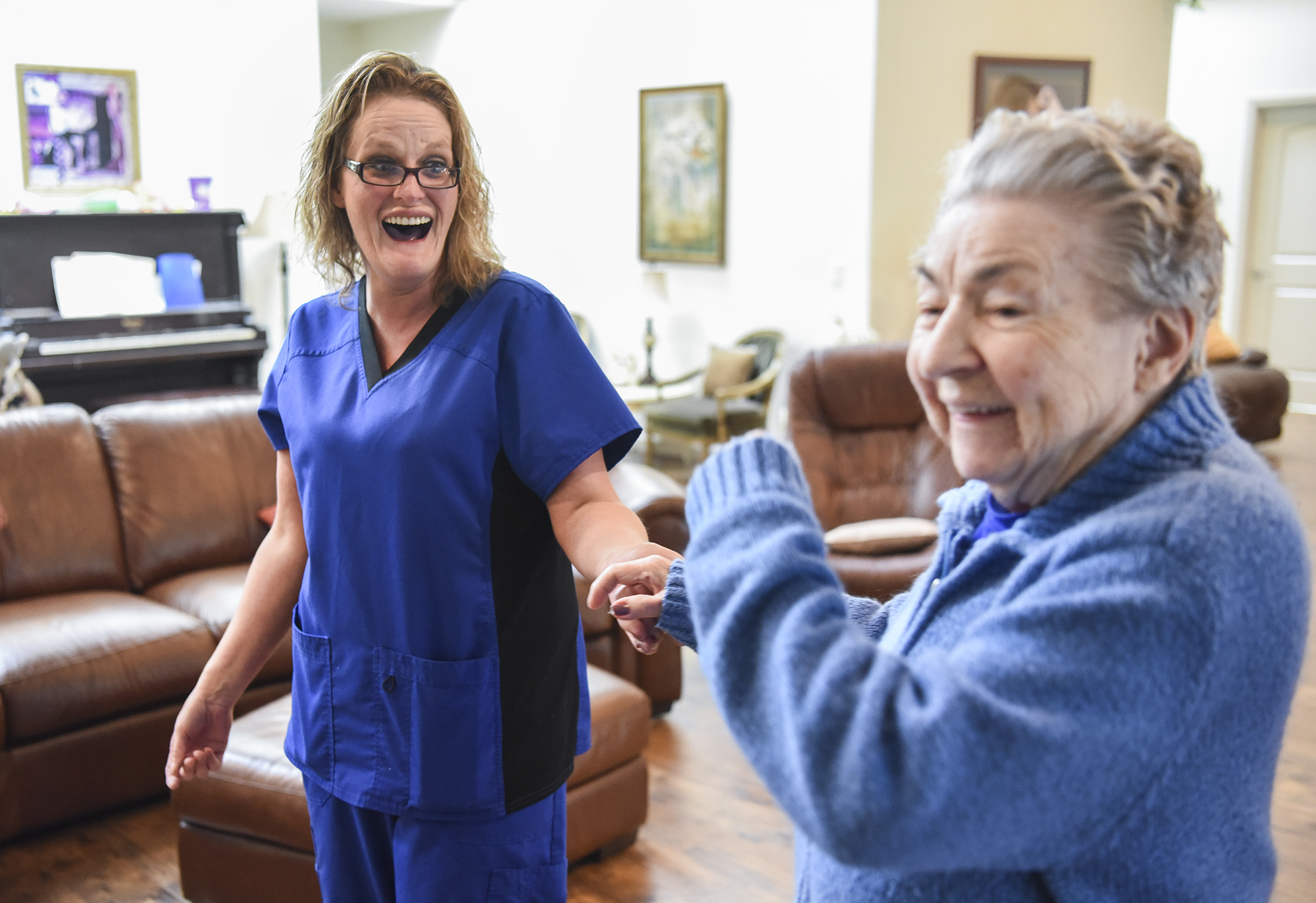
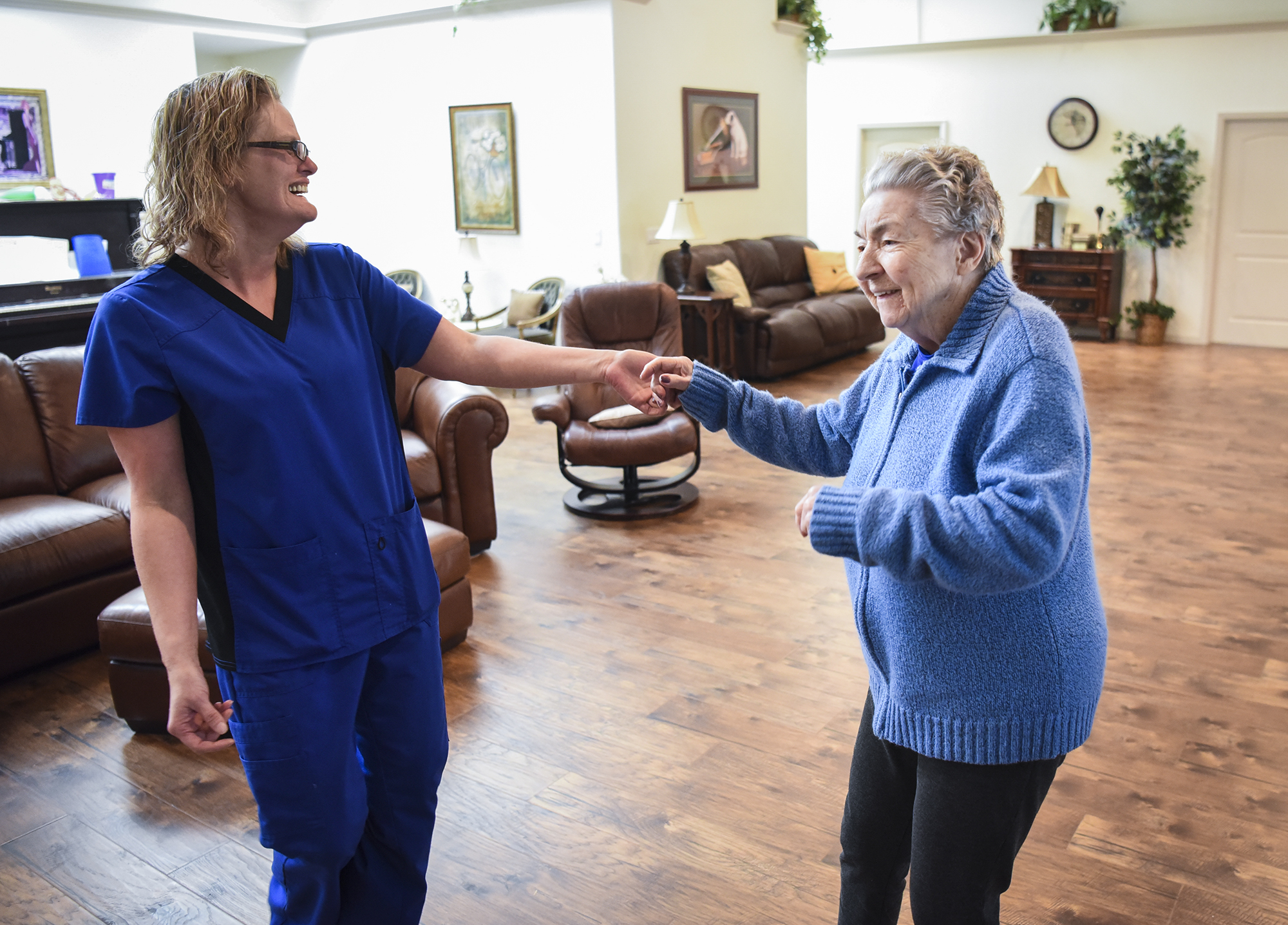
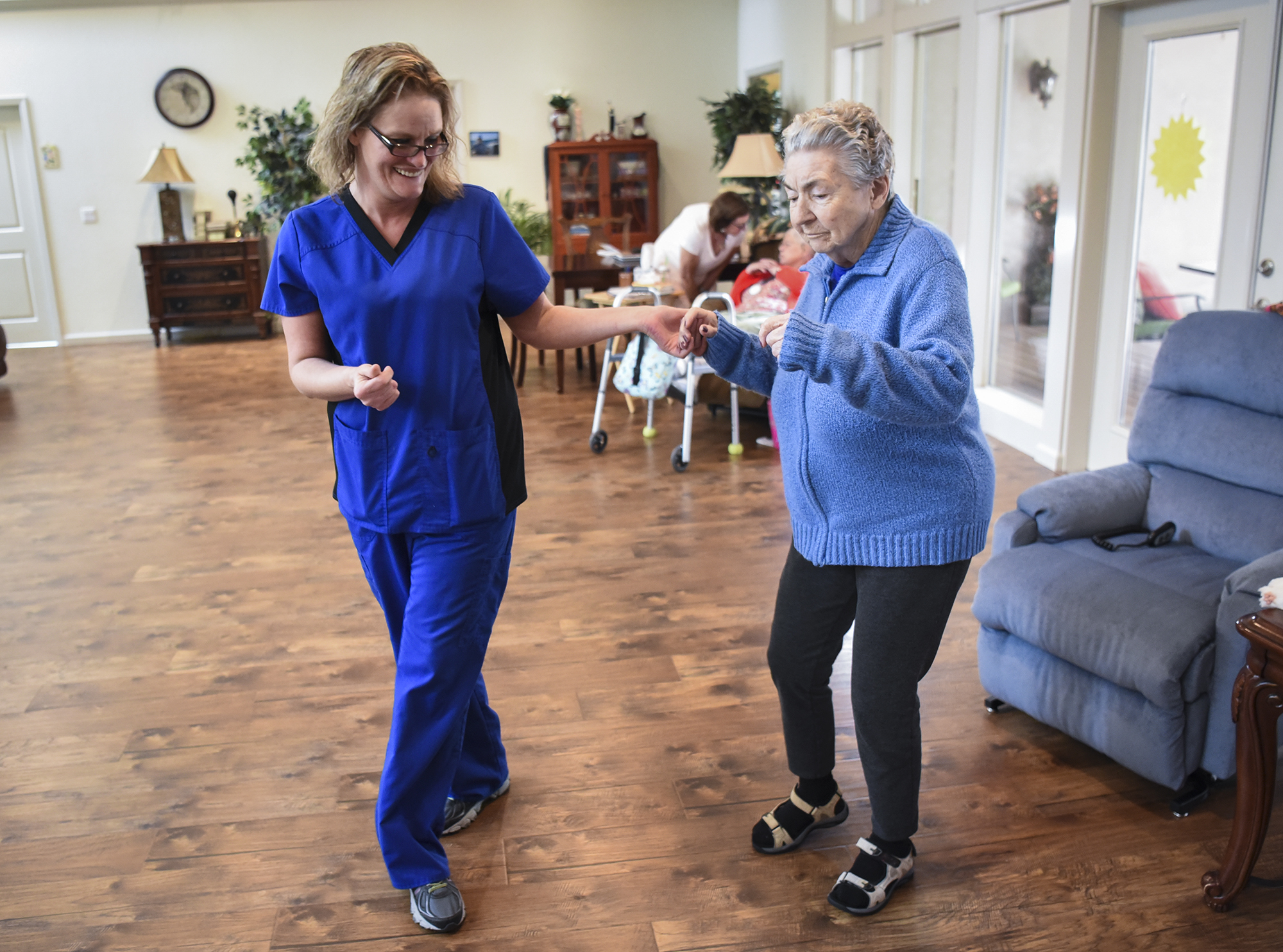
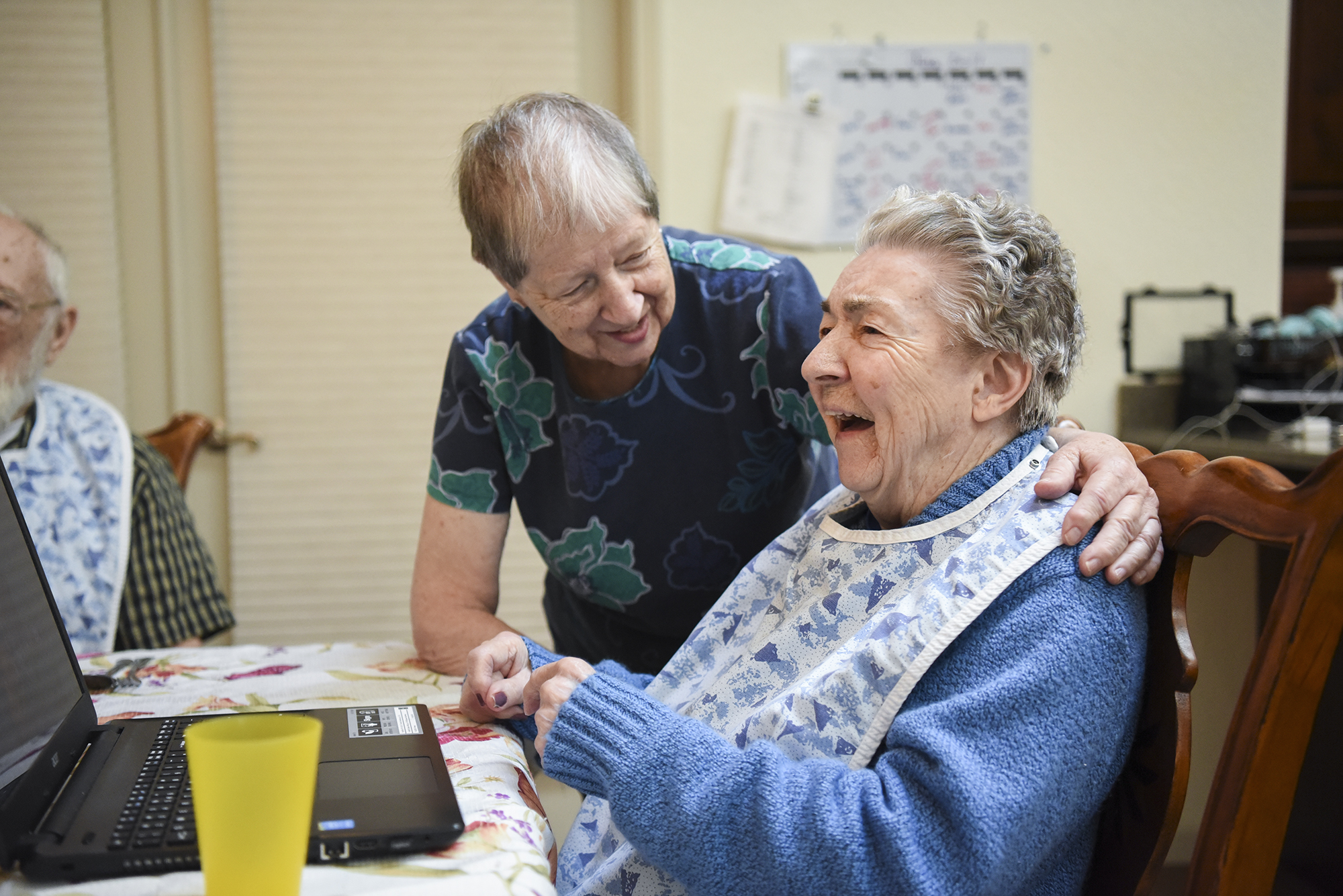
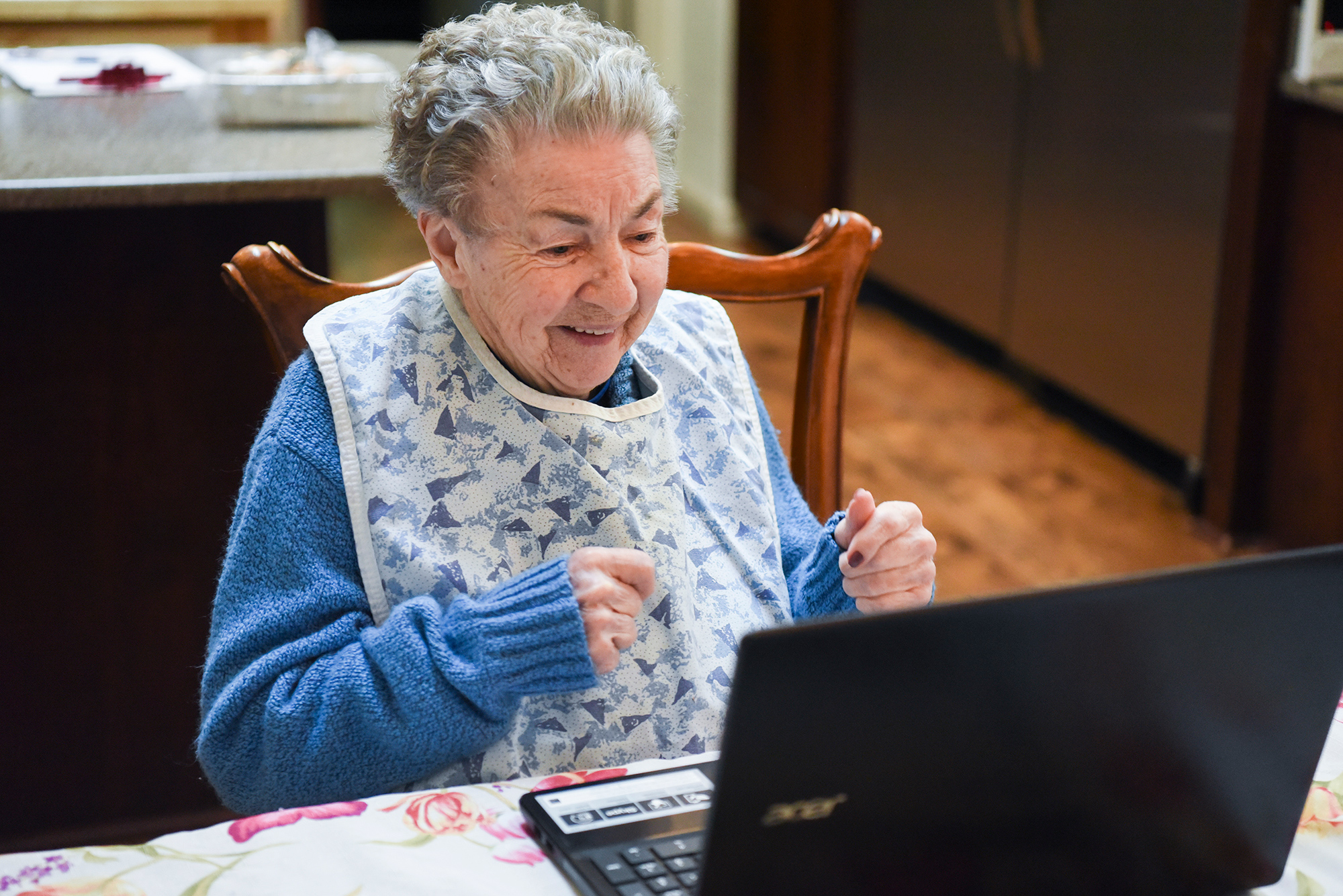
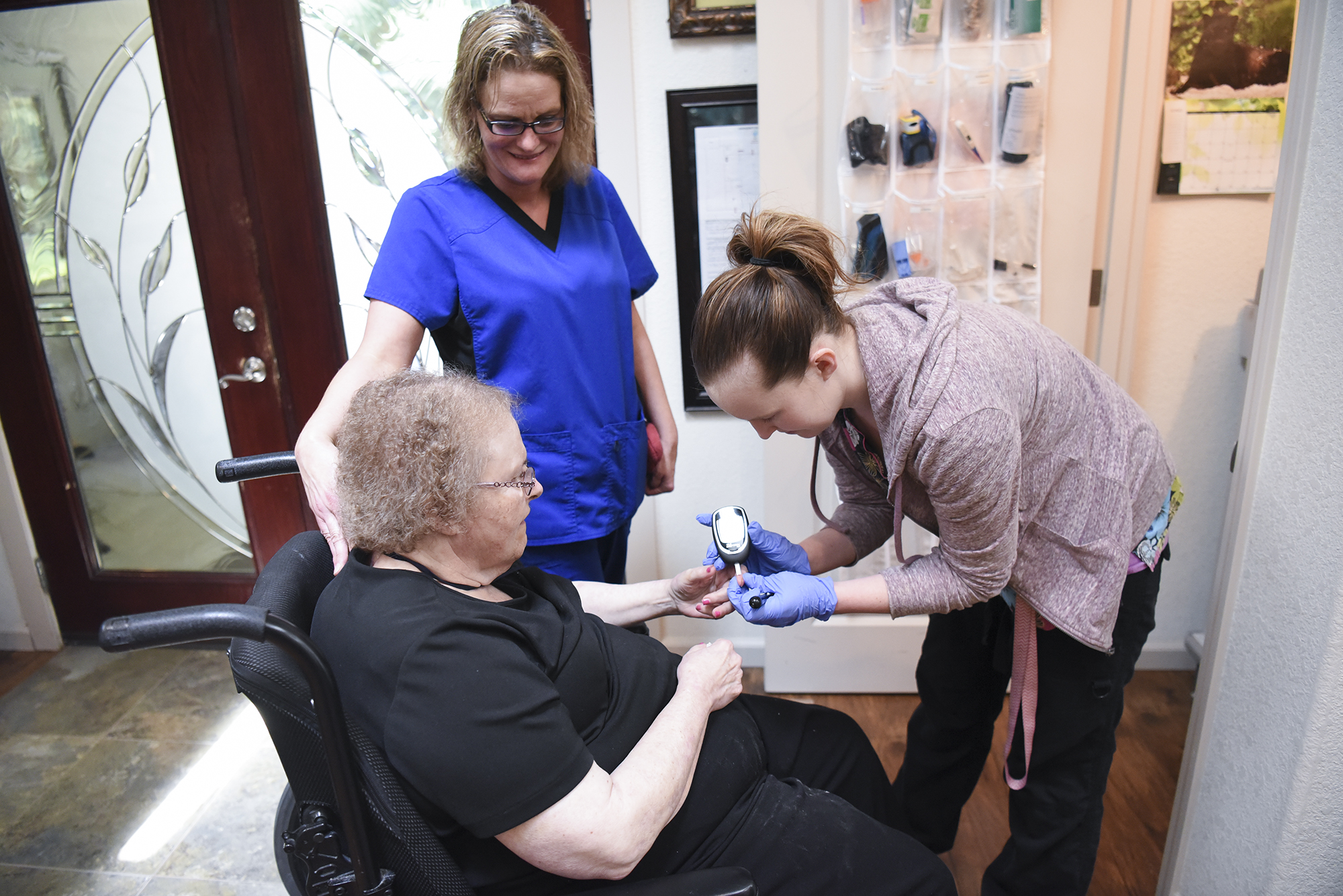
“She eats better when she dances,” Colson says. Colson also reminds a resident named Joe that he doesn’t need his blood pressure meds yet (and that she shares his passion for apricots). She helps Emily locate her favorite plush doll. She works with Casey, a new hire, to check Betty’s blood sugar and administer insulin. Then she heads for the kitchen to get lunch on the table.
Elvis keeps singing about happy prisoners. Emily’s visiting friend, Sonia Buist, a doctor, observes: “People like (Colson) make life tolerable for people who are basically imprisoned.”
Life’s daily puzzles
Why has Colson, 41, spent her adult life caring for others at a low wage that provides no health insurance? “Just your basic nurturer,” she shrugged. No big deal.
Caregivers: Most are uneducated, middle-aged, minority females.
- 89%: are women
- 58%: are nonwhite
- 45: median age
- 52%: have no formal education beyond high school
But choosing to nurture dementia patients — to keep smiling and chitchatting, cleaning up their messes, absorbing their irreversible confusions, delusions and declines — can be soul-sapping. Especially when the pay for taking on such personal responsibility is comparable to what you can earn selling six-packs at Plaid Pantry, Colson said.
What tilted Colson away from retail and toward caretaking? Her instinct for compassion is only part of it, she said; another big factor is curiosity. Colson has always been fascinated by the human mind, she said.
“Dementia is so intriguing and so different” than physical disabilities or other mental conditions, she said. She’s grappled with those too, in 20-plus years as a caregiver, including tending quadriplegic adults and children with mental illnesses — but nothing ever touched her like doing dementia care, she said.
“What they need from you is different every day,” she said, and it’s often up to you to figure out what those needs are — because people with dementia cannot communicate what’s happening on the inside. Sometimes Colson’s clients tell amazing, detailed stories about the rich and rewarding lives they’ve led — but the same folks often cannot remember the faces of their own family members, or which bedroom at Angelbrook is theirs, or even how to use the toilet.
Enlarge

Ariane Kunze/The Columbian
Sometimes their misery is apparent, but not its cause. On an office wall at Angelbrook, an acronym, “PBREATHE,” is spelled out as a reminder of the sorts of problems that would make any person uncomfortable — except that dementia clients may not be able to say so:
Pain
Bored
Restroom
Exhausted
Anxious
Thirsty
Hungry
Environment
“I like the daily puzzles of putting clues together and figuring things out,” Colson said. While she can’t make magic when clients ask for spouses who have died, or insist on going “home,” or cannot remember where they are and why — she’s an expert at helping such folks feel calmer and more loved, less confused and afraid.
Sometimes, loving distraction — like a sudden song by the irresistible Elvis — is itself an answer. “Interaction can be the solution,” Colson said. “Just asking, ‘How can I help you?’ can be a total reset.”
‘I like this’
Colson started down this path as a teenager, when a friend was applying for a day care job and Colson had no better ideas. She’s done all kinds of other work too, she said — and always found office and delivery-driver deadlines far more stressful and depressing.
“I’m lucky to be healthy. Money is not the only income, you know.” Caregiver Juli Colson
“I don’t have answers to traffic jams, but I have answers for this,” she said.
She could have spent 20 years doing busywork, Colson mused, and received no reward beyond money; instead, she said, she’s got “a pretty satisfied feeling.” She’s done all the prerequisites for a course of study in nursing, she added, but doesn’t feel inclined to follow through. “I like this,” she said.
But what about Colson’s own health needs? What about the lack of health insurance and gas-station wages? “I’m lucky to be healthy,” she shrugged. “Money is not the only income, you know.”
Doesn’t it get depressing? Don’t her spirits ever droop?
Not an issue, Colson said. “I can see myself with dementia,” she said. “Would you rather be taken care of by someone who’s grumpy and frowning? I would rather be taken care of by someone like me.”
Enlarge

Alisha Jucevic/The Columbian
Daniela Micu: Old-world values
“We need more caretakers,” Daniela Micu said. “I wish some Hollywood movie would make it glamorous.”
Glamorous? Shaving and bathing people, brushing their teeth and assisting them at the toilet?
“It’s a different kind of glamour,” Micu said. “It’s knowing you are bringing some peace and joy into the world.”
Micu recently had to remind and reassure one anxious resident — a military veteran — at her Columbia Care Home that all the exterior hubbub was just Fourth of July firecrackers. She reminded and reassured him repeatedly, countless times, all day long, she said.
Not a problem, she said. “He fought for me. This is a way for me to give back to him.”
Old and new worlds
Micu was raised in Romania, where her grandparents were a natural part of the household. That’s not something you find in most modern American homes, and Micu sees this; her care home, in the Vancouver Heights neighborhood, is also her own family home, where she’s raising two boys, now 10 and 14.
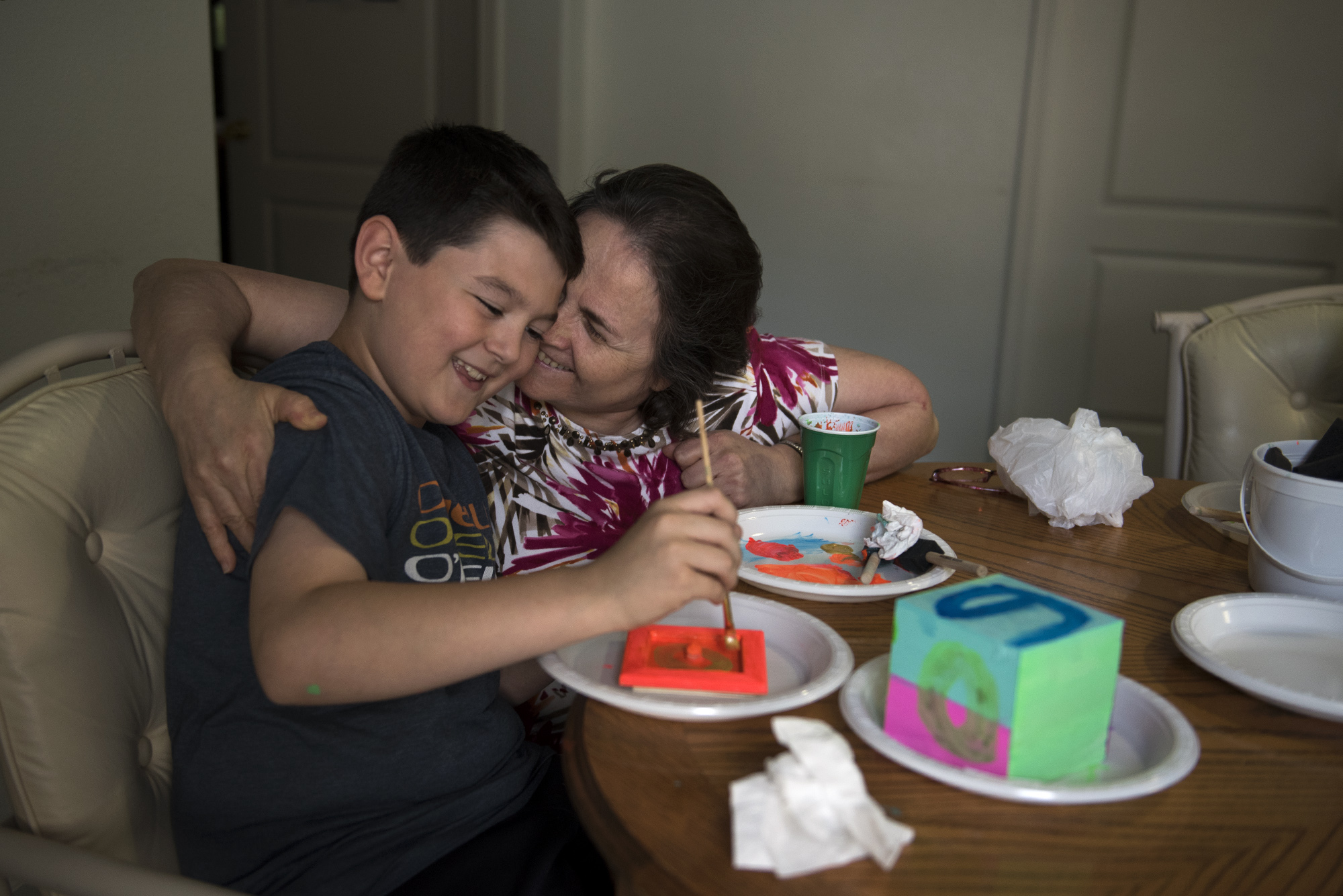
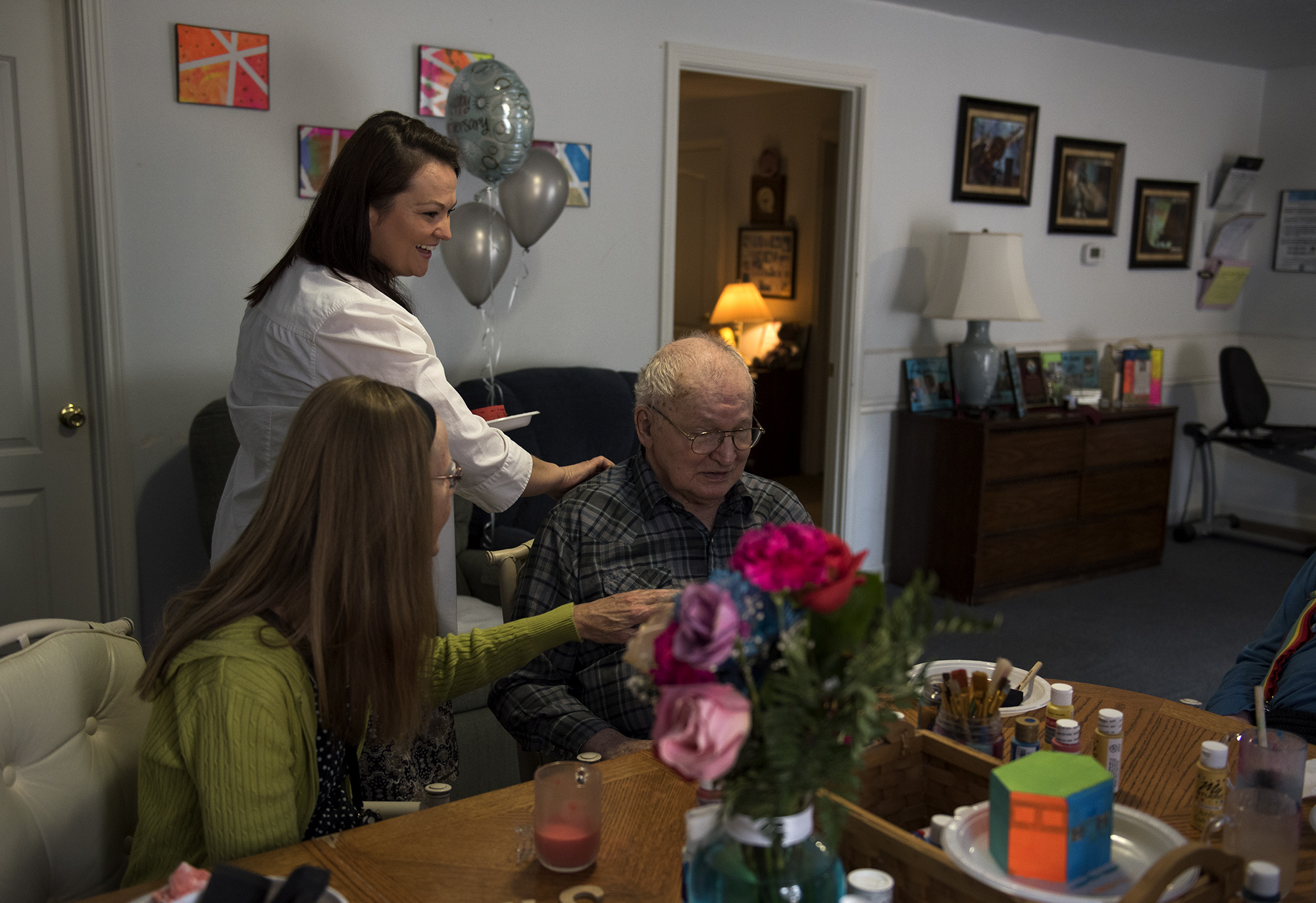
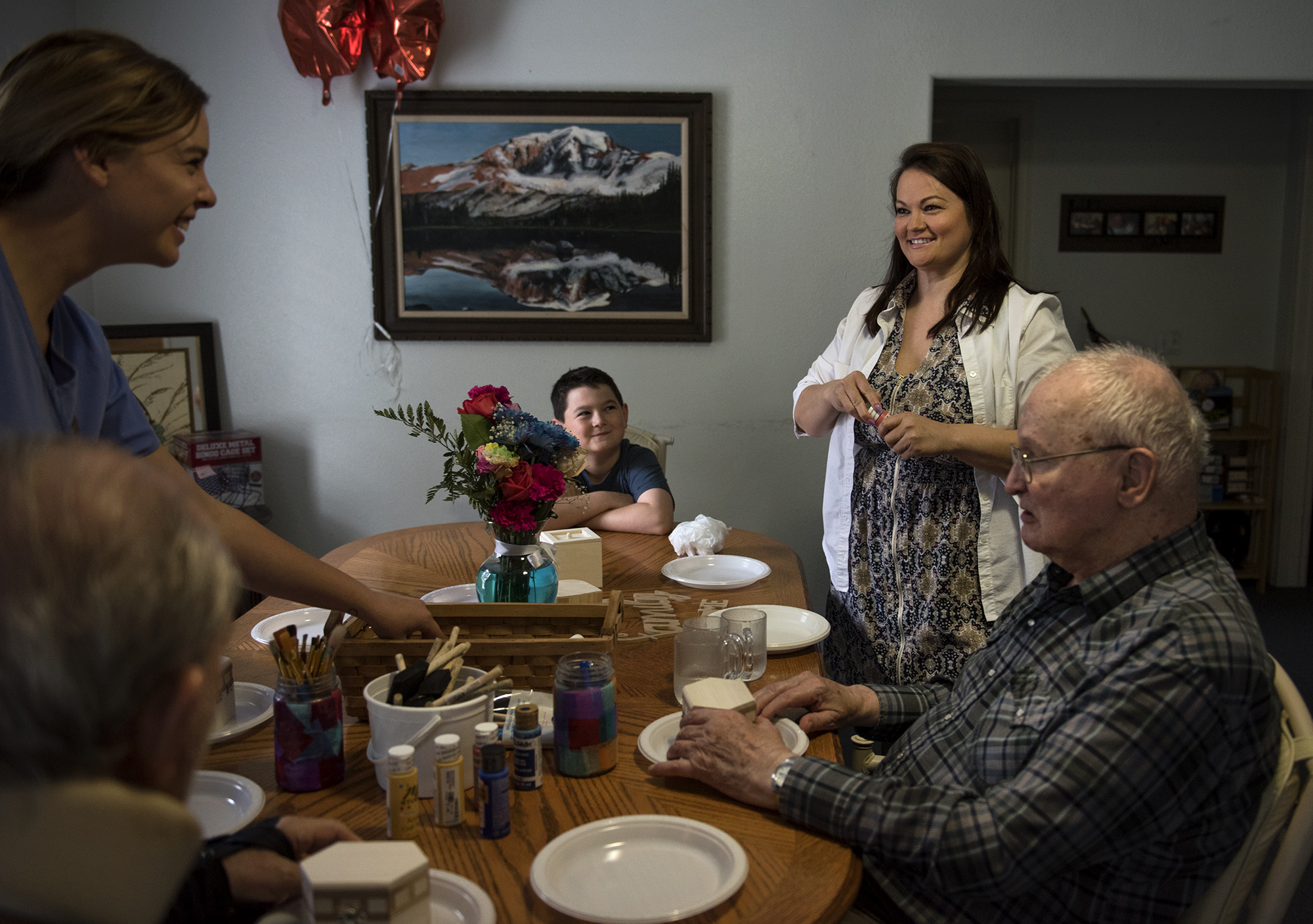
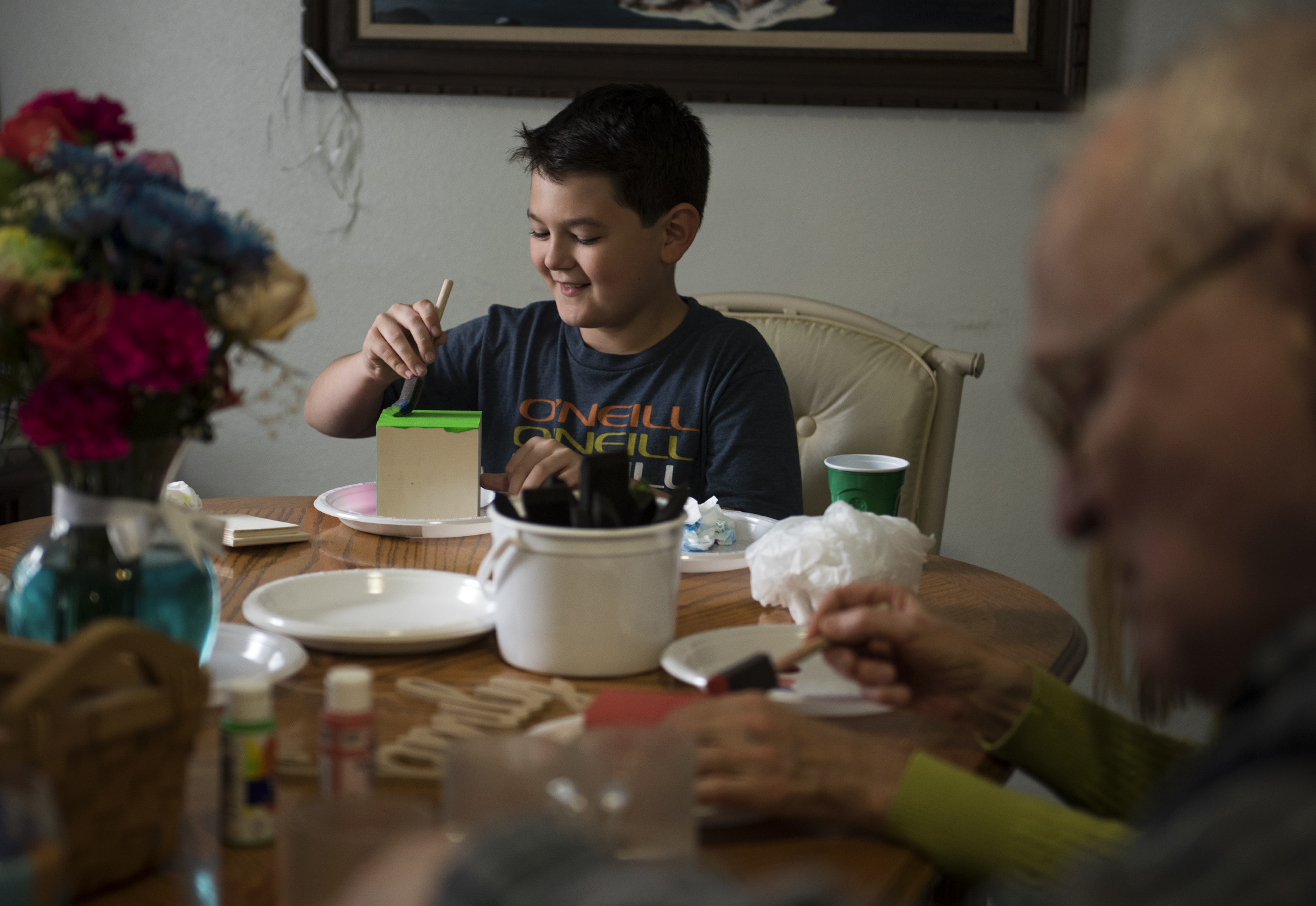
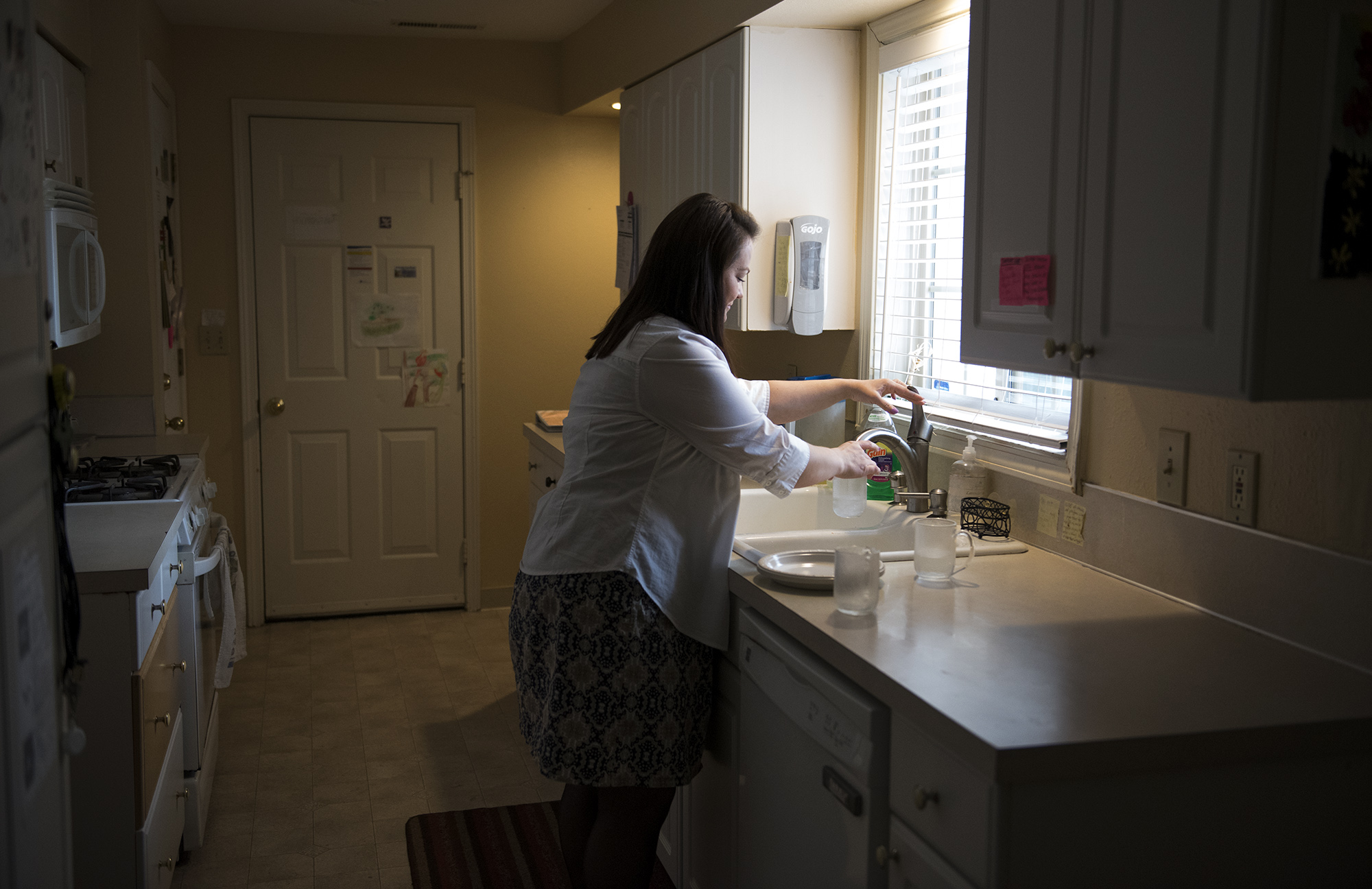
They aren’t legally allowed to “work” for her, she said — but they’ve gained the same easy familiarity with elders that their mom has always enjoyed. They like to hang out with the clients. Wheelchairs and weird answers don’t faze them.
“I’m proud of them. This has been a great way to raise kids,” Micu said. “I’ve told them, as soon as you’re 18, I’m hiring you!”
It’s a stereotype based in truth, Micu said: because of their big families and old-world values, many Eastern European immigrants find the American home care business a natural fit.
Bottom lines
But, glamorous? Micu laughed. It’s financially tough, she said. Depending on your clients and payments, “It’s almost charity work.”
Pay and security: Caregiver wages are low, hours are inconsistent, and benefits are meager.
- $10.11: median hourly wage for home care workers
- $13,300: average annual salary
- 67%: work part time
- 51%: receive some form of public assistance
- 26%: lack health insurance
Micu accepts government Medicaid payments on behalf of her lower-income clients — with daily rates that have improved lately, she said, but still don’t cut it. “Fifty, sixty dollars per day? You can help a friend, but you can’t run a business that way,” she said.
She’s compelled to balance those Medicaid clients with higher-paying ones. She’s been known to pitch in and try to find placements for Medicaid clients she can’t take; one time, she said, she called 36 different homes and heard the same answer she had to give: Sorry, I can’t afford that.
Most unglamorous of all, she said: the inevitable physical challenges, be they backaches, bites or bodily fluids. Micu said she’s been grabbed, scratched and kicked. She’s had patients reach down and proudly hand her what they produced on the toilet. She’s become an expert in defusing, distracting, reassuring and avoiding, she said.
Preventing is best of all, she said. “Sometimes somebody just looks off, and you don’t know why. It’s your job to figure it out,” she said. “If you take a few minutes up front, it can save hours of trouble later on.”
“You wear many, many hats. Cook, therapist, housekeeper, bathroom helper…” Caregiver Daniela Micu
Self-care
“You wear many, many hats,” Micu said. “Cook, therapist, housekeeper, bathroom helper…”
But sometimes, she said, you must take all those hats off and get some sun on your head. Micu loves heading to the beach with her sons for family playtime.
“I have to care for myself too,” she said. “You absolutely have to do that.”
After a longtime client died in her home last year, she said, the client’s family presented Micu with a gift of gratitude for years of quality caregiving: a round-trip ticket to visit family in Romania. It was the two-week vacation of a lifetime, she said.
“I hadn’t seen my grandmother in 14 years,” Micu said, choking up.
Scott Hewitt: 360-735-4525; scott.hewitt@columbian.com; twitter.com/_scotthewitt